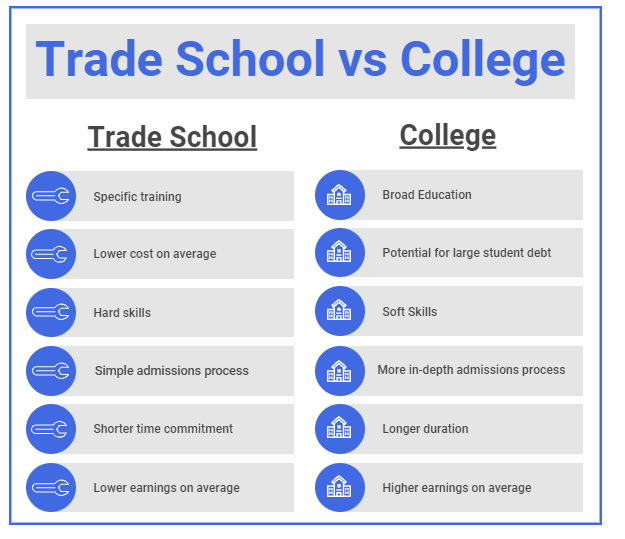
Image courtesy of Asiama Junior via Pexels
Table of Contents
Have you ever wondered what trade schools are all about? In recent years, trade schools have been gaining popularity as pathways to success for individuals who want to enter the workforce quickly and efficiently. If you're looking for an education that focuses on hands-on skills and practical knowledge, trade schools could be the perfect fit for you. In this blog post, we'll delve into the essence of trade schools, discuss the advantages they offer, demystify common misconceptions, and provide guidance for choosing the right trade school to unlock your potential.
The Essence of Trade Schools
Trade schools, also known as vocational schools or technical colleges, are educational institutions that specialize in providing skills-oriented training for specific industries. While traditional colleges and universities offer a broad range of academic programs, trade schools focus on preparing students for specific careers through specialized programs. Trade schools are often the ideal choice for individuals who prefer a more practical approach to learning and want to gain real-world skills quickly.
At trade schools, you'll find a diverse array of programs spanning various industries. Whether you're interested in construction and skilled trades, healthcare and medical professions, culinary arts and hospitality, or automotive technology and welding, trade schools offer programs designed to cater to your specific career aspirations.
Pros of Trade Schools
Trade schools offer several key advantages that set them apart from traditional education. Let's take a closer look at why trade schools may be the perfect stepping stone towards a successful and fulfilling career:
Affordability and Cost-Efficiency
One of the primary benefits of trade schools is their affordability. Traditional four-year college education can come with hefty tuition fees, accommodation expenses, and other associated costs. In contrast, trade schools typically have lower tuition fees and shorter program durations, which means you can get industry-ready faster without accumulating excessive student debt. By choosing a trade school, you can save money and potentially achieve higher return on investment (ROI) in the long run.
Skills-Oriented Education
Trade schools excel in providing hands-on, practical education that directly aligns with the demands of the industry. Unlike traditional colleges that emphasize theoretical knowledge, trade schools focus on equipping students with practical skills essential for their chosen professions. Through industry-relevant coursework, intensive training, and simulated work environments, trade schools ensure that graduates are job-ready from day one.
Expediting Entry into the Workforce
Trade schools allow you to enter the workforce faster than traditional college degrees. While a bachelor's degree can take four years or more to complete, trade school programs typically range from a few months to two years, depending on the specific field of study. This means you can start your career sooner and begin earning a steady income quicker. Many trade school graduates find themselves securing employment shortly after completing their programs, thanks to the focused training that meets the real-world needs of employers.
"Trade schools hold the key to unlocking your true potential and launching you into a successful career. Discover why they're a game-changer for unleashing the extraordinary within you."
Trade vs. Traditional Education: Demystifying the Stigma
There has long been a stigma surrounding trade schools, with some people considering them a less desirable option compared to traditional education. However, it is crucial to recognize that trade schools offer a distinct educational path that suits individuals with different strengths, goals, and career aspirations. While both trade schools and traditional colleges have their advantages, trade schools excel in providing practical skills and faster access to careers. It's important to embrace the diversity of educational options and choose the one that best suits your interests and career goals.

Image courtesy of www.zippia.com via Google Images
Finding the Perfect Fit: Choosing the Right Trade School
When it comes to choosing the right trade school, there are a few factors you should consider:
Accreditation and Certification Requirements: Ensure that the trade school you're considering is accredited and recognized by relevant industry organizations. This will validate the quality of the education you'll receive and ensure that your certification holds value in the job market.
Program Quality and Reputation: Research the reputation of the trade school and the specific programs it offers. Look for reviews, success stories from alumni, and reliable sources of information to assess the quality of education you can expect.
Job Placement Rates and Alumni Success Stories: Find out the job placement rates and success stories of graduates from your desired trade school. This can give you valuable insights into the school's track record of helping students thrive in their careers.
Trade School Options in Different Industries
The beauty of trade schools lies in their specialization across various industries. Consider the following industries and the potential trade school programs they offer:
1. Construction and Skilled Trades: From carpentry and plumbing to electrical work and HVAC, trade schools offer programs that prepare you for hands-on work in the construction industry. These programs provide essential skills for building and maintaining structures.
2. Healthcare and Medical Professions: Trade schools offer programs for aspiring medical assistants, dental hygienists, practical nurses, and pharmacy technicians, among others. These programs ensure you gain the necessary skills to contribute to the healthcare field.
3. Culinary Arts and Hospitality: If your passion lies in the culinary arts and hospitality industry, trade schools provide programs that focus on culinary skills, restaurant management, pastry arts, and more. You can develop your culinary talents and explore various career opportunities in the dynamic world of hospitality.
4. Automotive Technology, Welding, and More: Trade schools also offer programs in automotive technology, welding, aviation mechanics, graphic design, and many other fields. No matter your interest or passion, there is likely a trade school program designed to guide you towards a successful career.
Addressing Challenges and Overcoming Obstacles
While trade schools offer numerous benefits, it's important to acknowledge and address any potential challenges you may encounter along the way. Some common obstacles include financial constraints, lack of awareness about trade school options, and societal pressure to pursue traditional education. However, by seeking out scholarships, grants, and financial aid, conducting sufficient research about trade schools, and standing firm in your decision, you can overcome these challenges and confidently embark on the journey to success.

Conclusion
Trade schools provide an invaluable pathway to success, offering hands-on, skills-focused education that empowers individuals with the practical knowledge necessary to thrive in specific industries. By choosing a trade school, you gain access to affordable education, accelerated programs, and enhanced employment prospects. The wide range of trade school options across various industries ensures that there is a program suited to your interests and goals. Embrace the opportunities trade schools offer, unlock your potential, and launch yourself into a successful and fulfilling career.